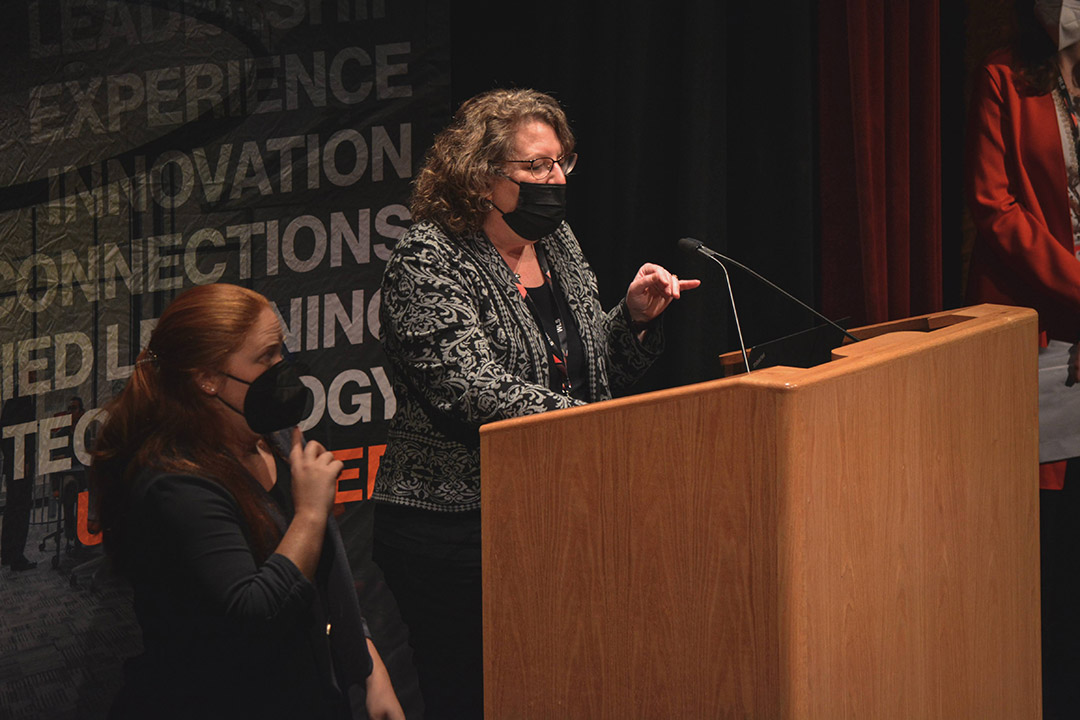Saunders College promotes gender equality through celebrations of women’s leadership in business
Annual events also emphasize need for support and mentorship
Natania Allan
Molly McGowan, senior lecturer and Director of the Leadership Academy in Saunders College, speaks at the Women’s Leadership Summit. The Summit helped current, prospective, and past students connect with each other and grow their leadership skills.
In 2019 and 2021, RIT’s President’s Commission on Women (PCW) conducted two focus groups with women students, faculty, and staff with an aim to determine what it will take to substantially increase the percentage of undergraduate women on campus. The focus group participants agreed that there is a need for greater support and community for women at RIT.
Saunders College of Business is rising to this challenge. The college has hosted an annual women’s leadership conference, Power Your Potential, for more than a decade, and this new research has inspired them to increase their efforts to promote women in business. So, the Leadership Academy at Saunders created the Women’s Leadership Summit, which aims to connect women, allies, alumni, and current and prospective students from the RIT and NTID community and to allow them to share career journeys and to develop new leadership skills and mindsets.
While the second annual Women’s Leadership Summit happened on Jan. 30, Power Your Potential will hold its 12th annual conference on March 4, creating a close succession of events in the spring semester as part of Saunders College’s focus on women’s leadership in business.
Natania Allan
Attendees mingle and network at the Women’s Leadership Summit.
“There’s not as many women leaders in business, and it’s very important to have diversity within leadership in all industries,” said Ann-Katherine L. Candelori, a fourth-year management information systems major from Glastonbury, Conn. Candelori is also the Chief Academy Officer for the Leadership Academy at Saunders.
The need for more women leaders is clear: the Center for American Progress said that “although they hold almost 52 percent of all management- and professional-level jobs, American women lag substantially behind men in terms of their representation in leadership positions,” as evidenced by the fact that “women are just 5 percent of Fortune 500 CEOs” as of 2018.
The PCW identified similar needs for increased representation and community for women throughout RIT. They studied women students during the 2019 focus group and women faculty and staff during the 2021 focus group. The women students, faculty, and staff advocated for a greater sense of support and a wider availability of safe spaces and communities for women at RIT, especially women of color, and the need for everyone at RIT to learn more about reducing discrimination and marginalization of women. Saunders College is doing its part to make strides toward these goals by promoting community, support, and education within the context of women’s leadership in business.
“Power Your Potential was created to help inspire women on campus and in our community, and as a way to celebrate Women’s History Month,” said Jacqueline Mozrall, dean of Saunders College. She said the longstanding annual event quickly gained popularity and continues to grow, attracting not only corporate sponsors but also top RIT alumni to speak and attend. “Power Your Potential provides an opportunity for women to share great ideas, network, and be inspired.”
This event takes place in the University Gallery and caters to RIT faculty, staff, alumni, and the local business community. However, the Leadership Academy at Saunders wanted to create a space for RIT students and prospective students to make similar connections with each other and with alumni and faculty.
Molly McGowan is a senior lecturer in the Department of Management and director of the Leadership Academy at Saunders, which hosted the first Women’s Leadership Summit in April 2021. She said that only around 40 people attended this first event, partially due to COVID-19, but, “it was just enough to spark interest and get people going. More people wanted to join the committee this year and be involved in the planning and take on leadership roles.”
Candelori became particularly crucial to the development of the Women’s Leadership Summit after that first year. She drew on her personal experiences, such as at the Grace Hopper Conference, to envision an expanded version of the Women’s Leadership Summit at RIT. After Candelori proposed her ideas to McGowan, the two spearheaded efforts to make these changes happen for a much larger event in 2022.
“This was an event where we wanted to inspire, connect, and educate women and allies at RIT to build not only connections and new friendships but also new skills and leadership tactics,” Candelori said.
She and McGowan both emphasized the value of mentorship and support systems for women at all stages of their careers to see themselves in leadership roles and learn the skills to reach new heights.
“When there’s a lack of women leaders in the workplace, it’s going to be harder for the younger women to advance,” McGowan said. “Without women around the table making decisions, we’re left out or marginalized.” She added that women leaders can help advocate for structural changes, like paid leave and flexible working hours, which will help increase everyone’s ability to thrive in the workplace. “Learning and networking, through these types of programs, can continue to help women build upon their successes and lead.”














